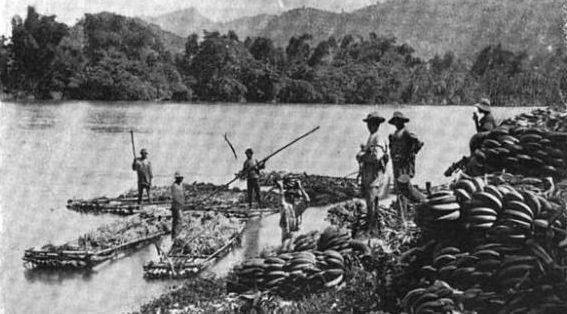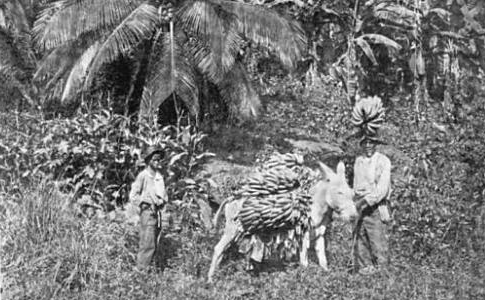
















Notably — at least for this enthusiast of Jamaican culture bubbling through the American mainstream — to help stage Lil Wayne’s big comeback, producer Bangladesh contributed another a-milli-esque banger, in this case opting to deliciously substitute Harry Belafonte’s well-worn Jamaicanisms for Phife Dog’s more obscure ragga filigree —
What’s funny — and telling, in a lost-in-translation-but-who-cares sorta way — is that the centerpiece of the song is a sample of the part of Belafonte’s recording that departs oddly, and some would say wrongly, from the Jamaican folk song that is its source. A chorus chanting six foot, seven foot, eight foot, bunch! underpins Weezy’s relentless show-and-prove show, but as the Honorable Doctor Louise Bennett Coverly — better known as Miss Lou — would explain, bananas don’t come in feet, they come in hands. Or as she puts it, they don’t have toes, they have fingers!
You have to hear how Miss Lou puts it herself. If you aren’t familiar with the pioneering work of Miss Lou, you should know, at least, that she’s a towering figure in Jamaican culture, more responsible than perhaps anyone else for recuperating the distinctive twists and turns of Jamaican creole English, aka patois / patwa. (Miss Lou’s legacy on this count includes her legitimation of alternate spelling and pronunciation practices.) Not only was Miss Lou a walking, talking, singing vessel of Jamaican folklore, she also created a body of patwa poetry that has been committed to memory by generations of Jamaican children and which includes my favorite poem about reggae (even though it was written in 1966, before reggae hit the town).

















Just hear how she tells the story of “Banana Boat Song” and coaxes a sympathetic call&response from her adoring audience (note: after thinking aloud about it — what year it was? — Miss Lou guesses it was the 1960s when she and Belafonte first sang the song together, but given that Calypso came out in 1956, she must have meant the 50s):
Louise Bennett, “Banana Boat Song” (from Lawd…Di Riddim Sweet)
[audio:http://wayneandwax.com/wp/audio/misslou-BBS.mp3]
The only thing is I did teach him to say “6 hand, 7 hand, 8 hand” and him a say “6 foot, 7 foot” [laughter]. My dear! So I said, after it became famous now, I think, great. Singer of Jamaican folk songs. I say, “Harry, but what about this foot ting? Banana don’t have toe, y’know. Di banana have fingers.” Him say, “yes.”
Notably, Belafonte did apparently eventually correct his rendition. By the time he’s performing the song on the Muppet Show in 1978, we’re back to “hand” —
But the classic version, as heard on the old 78, as famously re-animated in Beetlejuice, and now again given new life by Bangladesh, most definitely says “foot” —
And, so, funny enough, the one part that Belafonte gets bizarrely backwards is the part that Bangladesh and Weezy fasten onto. This makes sense: it sounds like a proud, strong-backed boast in Belafonte’s rendition, fit for full-throated brag-raps and ennobling folkloric worksongs alike.
What’s especially interesting then, about Miss Lou’s exegesis, is that it’s not so much about the correct body part to describe clusters of bananas, it’s about the central meaning of the song itself. The workers may be strong and proud; they came to work, not to idle. But they’ve been working all night and they’re exhausted. They waaaaaaan go home, and they want the bossman and the tallyman to take it easy on them as they make the final, daybreak round of a backbreaking night.

Hearing Miss Lou provide the context makes one hear even the exclamation on “bunch” as less a matter of celebration and more of consternation — “Banana Boat Song,” she explains, is a good ol’ workaday kvetch:
That is a banana loading song, and you sing it when it coming on to morning time and the poor men — mostly they were men — working at this loading of the banana boat, the whole night, and when you coming out at like four o’clock in the morning, dem waan go home. And they wanted the smallest amount of bananas they can get. And you know the six-hand little? Of course, those stay. Seven-hand. Eight-hand. Bunch!? Nine. Ten. Bunch!?! Cooyah. Noh gimme so-so bunch, me no horse wid bridle. [laughter]
Now, Miss Lou’s explanation might itself merit some explication, at least for those who aren’t quite up on their patois proverbs or banana facts. About the horse and the bridle: this is a colorful and humorous worker’s plea, eager to intervene before he gets too heavily weighed down. He’s cool (cooyah) with the reasonably-sized stems, the smaller sets of clusters, the six-hands and seven-hands and so forth. But not a bunch! And certainly not a bunch like that, not so-so bunch. If he were a horse with a bridle maybe he could handle such a load, but poor overworked human that he is, a whole bunch at this point strikes him as unfair — and worthy of some patois-peppered protest.

The use of so-so here marks a significant way to voice the resistance of an Afro-Jamaican laborer. As this Dictionary of Jamaican English elaborates, so-so(h) is possibly derived from a Yoruba term (sho-sho). Of course, tellingly and a little confoundingly, it sources the very line Miss Lou quotes from the “Banana Boat Song” as an example of usage:
Now, if all that six-hand, seven-hand stuff is still not clear, we can look to, say, early twentieth-century accounts of the burgeoning banana industry for some good technical prose. In his 1914 work, Conquest of the Tropics: The Story of the Creative Enterprises Conducted by the United Fruit Company, Frederick Upham Adams provides the basic lowdown on counting clusters while specifically big-upping Jamaica and black Jamaican workers (who, we should note with a nod to reggaeton, were also crucial, as migrant workers, to the operation of plantations across Central America):
…A bunch of bananas consists of a stem, hands, and fingers. Each hand has from ten to fifteen fingers. A bunch of bananas is thus known to the trade as a “five-hand stem,” “a six-hand stem,” and from that up to the nine or ten-hand stems, which are average commercial limit, though Costa Rica has produced stems containing as high as twenty-two hands — a veritable giant of tropical fecundity.
.
In Jamaica the bananas range from five to nine hands to the bunch, with an occasional one exceeding this grading, but the individual fingers are smaller than those which grow in the humid lowlands of the Central American coast. But they are good bananas, wholesome and marketable. The Jamaican negro is the workman who has made possible the wonders which the United Fruit Company has achieved in Central America, and Jamaica can lay just claim as the birthplace of the banana industry.
And now, dear readers, as they say inna Jamaica, you done know.
It may not matter much to that Wayne and his flights of fancy, but it does to this one.


















Give him a hand Ladies and Gentlemen for this truly rich post on Patwa and Jamaican cultural history–
Very well written! One thing though, you mentioned:
“Miss Lou guesses it was the 1960s when she and Belafonte first sang the song together, but given that Calypso came out in 1956, she must have meant the 50s”.
However calypso was brought to the Caribbean by the slaves from West Africa and the first calypso song was recorded circa 1912. I appreciate the time you took to research this and post, though. Great job!
Thanks, Annie, for the nice comment and the retweets! I’m glad to have more eyes on this post —
including yours, Jam Central, though I’m afraid you’ve misunderstood me. I wasn’t saying that the genre of calypso dates to the 50s. As you note, it has much older roots than that. What I meant, and the reason I capitalized and italicized the term, is that Harry Belafonte’s album entitled Calypso — which featured “Banana Boat Song” and brought this strange twist on it to millions of farin ears — was issued in 1956.
And thanks to Eddie Stats for the nod over at LargeUp!
& thx to Birdseed for sharing this germane clip (tantalizing as it is w/ such brief, fragmentary glimpses of MPC action) —
Thanks for clarifying, my mistake.
great post, cant believe i missed it … 2 days before xmas, fulla fruitcake distractions supongo. when i learned of the sample, my first thought was the herbie hancock / madonna watermelon brother kinda thing. comparison isnt holeproof, but didnt belafonte cover a folk song and then copyright it as his own? maybe guantanamera is a better analogy. anyways, i love that bananas and ponies/horses are measured in hands, and pours of wine measured in fingers, and british people in stones.